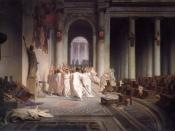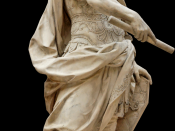Shakespear's Julius Caesar
Marcus Antonius (Mark Antony): One of the Triumvirs (leaders) who rule Rome following Caesar's assassination. Mark Antony (Marcus Antonius) is famous in this play for his speech, which turns the Romans against Brutus following his group's assassination of Caesar. Famous for the immortal lines "Friends, Romans, countrymen, lend me your ears;" (Act III, Scene II, Line 79), Mark Antony with fellow Triumvirs, Octavius and Lepidus later defeat Brutus and Cassius on the Plains of Philippi in Act V.
Marcus Brutus: The most complex character in this play, Brutus is one of the men who assassinate Caesar in the Senate. Brutus is complex, because he does not kill Caesar for greed, envy nor to preserve his social position like so many of the other conspirators against Caesar. This Brutus makes very clear in his speech in Act III, Scene II (Lines 12-76), when he explains his actions as being for the good of Rome.
Unlike the other conspirators, Brutus is in fact a dear friend of Caesar's but kills his beloved friend not for who he is, but what he could become as a King. It is for this reason that when Brutus dies by suicide in Act V, Mark Antony describes his bitter enemy by saying "This [Brutus] was the noblest Roman of them all;" (Act V, Scene V, Line 68). Mark Antony recognizes with these words that Brutus acted from a sense of civic duty, not malice, nor greed nor envy.
In academic circles, Brutus is still a source of much heated debate; does assassinating a leader for the good of the people constitute bravery worthy of a tragic hero or can the end never justify the means? The controversy on whether Brutus is tragic hero or villain still rages...
Ironically, though it can be argued that Brutus assassinated his friend to prevent one man ruling the Roman Empire, history was later to make this a reality. Octavius, one of the Triumvirs who defeated Brutus and Cassius, was later to become a Roman Emperor ruling the entire Roman Empire alone following his victory over Cleopatra and Mark Antony.


